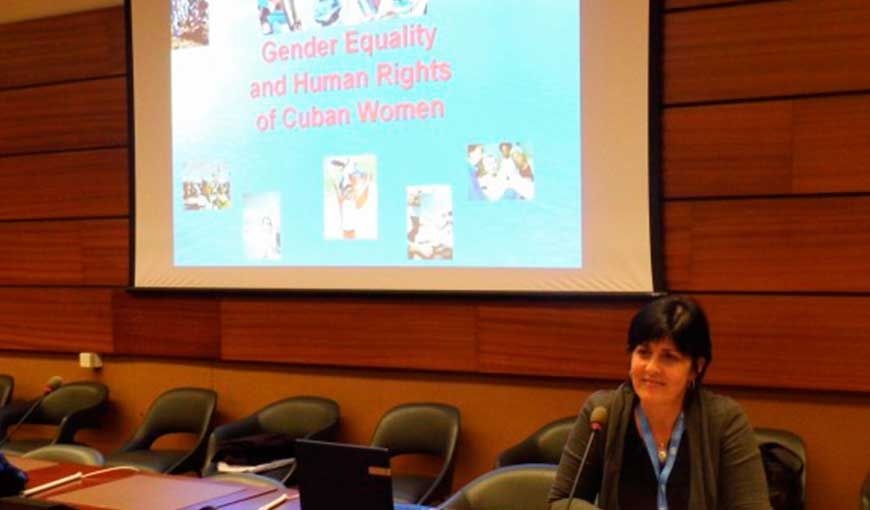
Carolina Amador, como representante de la FMC en ese año, presenta en Ginebra la conferencia “Igualdad de género y los derechos de la mujer en Cuba” en 2013. Foto: Tomada de Cubadebate.
FMC’s Hate Rally Contradicts Objectives
24 / diciembre / 2020
On December 8th 2020, the Federation of Cuban Women (FMC) organized a hate rally against independent journalist Iliana Hernandez. It took place right in front of her family’s home.
At least a hundred people, including students from a sports academy, were mobilized to go to Hernandez’s home. They were enough to fill the block. With loudspeakers blasting loud music, posters, and the mass organization’s flag and Cuban flags, they shouted pro-government slogans, insults and belittling comments outside their target’s door. It lasted for at least half an hour, judging by the Facebook Live stream Hernandez broadcast.
Many people publicly condemned the attack on social media. They commented how contradictory it was for an organization responsible for defending Cuban women’s rights to lead the show of abuse.
The following day, the FMC published a statement “condemning the meddling and mercenary acts against Cuba.” It stated: “members of the Cuban federation, Vilma’s and Fidel’s children, do not accept, and will never accept, pressure or blackmail from those who serve the Empire and are attempting to sabotage Cuba’s political, economic and social order (…).” The message emphasizes that they “have morals and the weight of truth on their side, to confront and emphatically condemn protests against the Revolution”. They ended with the oath that “Cuba’s streets are and will always belong to the revolutionaries!”
The FMC said that the organization’s political and ideological stance gives it the right and legitimacy to “emphatically condemn”. Such is recognition for the hate rallies, an unfortunate and long-standing tradition in Cuba ever since the 1980s, beginning with the Mariel exodus. Ever since then, these events are the expression of extreme hate, intolerance and discrimination. The government not only allows them (even when they involve physical attacks), but also encourages.
Ailynn Torres, a psychologist and feminist, said that the so-called “acts of repudiation” are a euphemism for a hate policy and discourse.” UNESCO defines such as “expressions that incite harm (especially discrimination, hostility or violence) based on the identification of a victim as a member of a certain social or demographic group. It can also include a discourse that incites, threatens or encourages acts of violence.”
The Federation of Cuban Women says its mission includes the complete incorporation and promotion of women “in the country’s economic, political, social and cultural spheres, promoting a climate of gender equality and equal opportunities.” Its Guidance Houses in every Cuban municipality “provide guidance, advice and training and information in matters such as the fight against violence, education and the law.” Among its “main duties” include legal knowledge of women’s rights and the channels for demanding these.
In supporting hate rallies, the FMC is not only disregarding its principles as a civil society organization in Cuba, but also compromises its role as an expert organization at the UN Economic and Social Council (ECOSOC), where it has acted as a consultant and special rapporteur ever since 1997.
Both the FMC’s internal guidelines, as well as those of the international organizations it belongs to or collaborates with, establish the promotion and protection of civil and political rights.
Hate rallies compromise the dignity and attack the integrity of those mobilized to take part. Likewise, that of their targets, placed in a vulnerable situation by them. Even more absurdly, when committed by the organizations and institutions socially responsible for looking out for their rights. Instead, they flaunt their license to violate these rights, protected by a government agenda.
This article was translated to English from the original in Spanish.


If you believe that our journalism is important for Cuba and its people, we want you to know that this is a critical moment.
Behind each publication there is a team that strives to ensure that our products meet high quality standards and adhere to professional and ethical values.
However, to keep a close watch over government, demand transparency, investigate, analyze the problems of our society and make visible the hidden issues on the public agenda is an effort that requires resources.
You can contribute to our mission and that is why today we ask for your help. Select the way you prefer to send us a donation.








comments
We moderate comments on this site. If you want to know more details, read our Privacy Policy
Your email address will not be published. Mandatory fields are marked with *